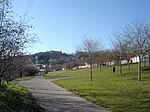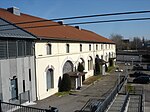Passerelle de la Paix

The Passerelle de la Paix ("skyway of peace") is a pedestrian and bicycle bridge over the Rhône river in Lyon, France. It connects the 6th arrondissement of Lyon and the commune of Caluire-et-Cuire.Grand Lyon commissioned the construction of a bridge between Cité Internationale and Place Basse Demonchy in Parc Saint-Clair in Caluire-et-Cuire. The project was first conceived in 1994, but construction was held up by a legal dispute over who would be the primary contractor. The project was revived in 2009 with Austrian architect Dietmar Feichtinger creating the design for the bridge. The construction of the bridge began in March 2012. The bridge was named "Passerelle de la Paix" on 22 October 2012 to represent intercultural harmony, because the neighbourhood of Saint-Clair has a large immigrant population. Construction concluded on 13 December 2013 and opened to the public on 17 March 2014. The bridge has two sections: a 217-metre (712-foot) long upper section for pedestrians and bicycles, and a 156-metre (512-foot) long lower section uniquely for pedestrians.
Excerpt from the Wikipedia article Passerelle de la Paix (License: CC BY-SA 3.0, Authors, Images).Passerelle de la Paix
Passerelle de la Paix, Lyon Cité Internationale
Geographical coordinates (GPS) Address Nearby Places Show on map
Geographical coordinates (GPS)
| Latitude | Longitude |
|---|---|
| N 45.7868823 ° | E 4.8542305 ° |
Address
Passerelle de la Paix
69006 Lyon, Cité Internationale
Auvergne-Rhône-Alpes, France
Open on Google Maps










